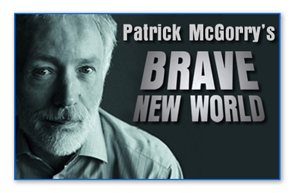 Note from CCHR: CCHR International was the first organization to expose the complete insanity of psychiatrist and “Australian of the Year” Patrick McGorry’s campaign to “pre-diagnose” children before they ‘develop” mental disorders. But we’re no longer the only ones. Even his fellow psychiatrists are attacking it. Let’s just break it down; psychiatrists admit there are no medical tests in existence to prove any child suffers from a mental ‘illness.” Diagnoses is based solely on opinion, yet more than 20 million children worldwide have been ‘diagnosed’ and prescribed dangerous and potentially lethal drugs based on nothing more than psychiatry’s junk science. Yet this doesn’t seem to be a problem to McGorry, or Australia for that matter, considering they just allocated $400 million to McGorry’s crystal ball theory of “pre-diagnoses,” for ‘psychosis’ adding even more lunacy to the child labeling and drugging epidemic that is literally killing kids. Now that, is psychotic – and it’s psychiatrist Patrick McGorry that’s leading the way.
Note from CCHR: CCHR International was the first organization to expose the complete insanity of psychiatrist and “Australian of the Year” Patrick McGorry’s campaign to “pre-diagnose” children before they ‘develop” mental disorders. But we’re no longer the only ones. Even his fellow psychiatrists are attacking it. Let’s just break it down; psychiatrists admit there are no medical tests in existence to prove any child suffers from a mental ‘illness.” Diagnoses is based solely on opinion, yet more than 20 million children worldwide have been ‘diagnosed’ and prescribed dangerous and potentially lethal drugs based on nothing more than psychiatry’s junk science. Yet this doesn’t seem to be a problem to McGorry, or Australia for that matter, considering they just allocated $400 million to McGorry’s crystal ball theory of “pre-diagnoses,” for ‘psychosis’ adding even more lunacy to the child labeling and drugging epidemic that is literally killing kids. Now that, is psychotic – and it’s psychiatrist Patrick McGorry that’s leading the way.
The Australian – June 14, 2011
by Sue Dunlevy
PATRICK McGorry’s model of early diagnosis of psychosis, favoured by the federal government and the Coalition in their mental-health policies, has come under attack from a leading US psychiatrist, who warns that predicting psychosis is unreliable and could lead to patients being wrongly medicated.
Allen Frances, who chaired the committee that produced the current diagnostic bible for psychiatry, the DSM-IV, has warned that Professor McGorry’s Early Psychosis Intervention Centres do not have a reliable early diagnosis tool.
Professor Frances, an emeritus professor at Duke University in North Carolina, fears early diagnosis could lead to people without psychosis being put on medications that have serious side-effects, including massive weight gain.
He has also attacked the Gillard government’s plans to spend $222 million expanding Professor McGorry’s EPIC program by another 16 centres as a “vast untried public-health experiment”.
“The Australian experiment will be flying blind on an airplane that is not at all ready to leave the ground,” he said in a blog posted on Psychology Today in the US.
His concerns are shared by Adelaide University psychiatry professor Jon Juredini, who says the Gillard government should have shared mental-health funding around many different early intervention projects to see what worked best. “A lot of the evaluation of EPIC shows any advantages it has disappear over time, so that tends to suggest that in terms of intervention they are good while they are happening, but they don’t necessarily give long-term protection,” Professor Juredini told The Australian.
Their criticism came as the past president of the Royal Australian College of Psychiatrists, Louise Newman, attacked the $197 million the government will spend on expanding the number of Headspace youth mental health centres from 60 to 90.
“There have been certain statements about the efficacy of the Headspace approach that have been overstated,” she told Australian Doctor magazine.
Early intervention to prevent mental illness needed to happen at a much earlier stage of development than adolescence, Dr Newman said.
A spokeswoman for Mental Health Minister Mark Butler said the government was making substantial investments in youth mental health and early psychosis prevention services. “We are confident these evidence-based models will be of benefit to young Australians,” she said.
Professor Frances’s arguments have been seized on by Scientologists, who argue against the notion of mental illness.
Although Professor Frances chaired the committee that produced the fourth version of the Diagnostic and Statistical Manual of Mental Disorders in 1994, he has been left off the panel developing the fifth version.
He has written extensively of his concerns about how strict medical definitions of mental illness can lead to misdiagnosis by non-experts.
Professor McGorry dismissed Professor Frances’s attack as a “beat-up”, and said no one received anti-psychotic drugs at his centres unless they had had a psychotic episode.
While Professor Frances agreed that Professor McGorry did not recommend anti-psychotic medication as a preventive measure, he feared general practitioners might overuse the drugs if they started using Professor McGorry’s diagnostic tool for early psychosis.
Professor Frances said in his Psychology Today blog that early intervention to prevent psychosis required first that there be an accurate tool to identify who would become psychotic.
“The false positive rate in selecting pre-psychosis is at least 60-70 per cent in the very best hands and may be as high as 90 per cent in general practice . . . these are totally unacceptable odds,” he said.
Professor McGorry agreed that false positive rates of diagnosing prepsychosis were high, but said the first line of treatment for people who had sub-threshold psychosis was supportive care.

